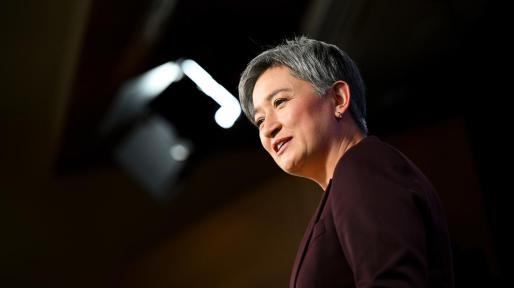Australia’s foreign minister urged Pacific island countries on Thursday to stay united in the face of great power competition as she visited New Caledonia, where the president raised concerns about Australia’s AUKUS nuclear submarine programme.
Foreign Minister Penny Wong’s visit to the French territory coincides with a push by a China-backed group for several Pacific island nations, including New Caledonia, to sign a splinter security pact.
The region’s main diplomatic bloc, the 18-member Pacific Islands Forum, which includes Australia, last year rejected a push by China for 10 nations to sign a security and trade deal amid concerns by the United States and its allies over Beijing’s military ambitions.
Solomon Islands, the only Pacific island country with a security pact with China, is pushing for the Melanesian Spearhead Group of Vanuatu, Fiji, Papua New Guinea, Solomon Islands and New Caledonia’s leading pro-independence party, to create a sub-regional security framework which would also involve Beijing, statements show.
In a speech to New Caledonia’s Congress, Wong said the Pacific faced challenges from climate change, economic recovery after the COVID-19 pandemic and strategic competition, and “we believe a united Pacific Islands Forum is central to protecting our shared interests”.
“We are stronger together,” she said.
While New Caledonia is a French overseas territory, its president Louis Mapou, a pro-independence indigenous leader, is from the Kanak Socialist Liberation Front (FLNKS), a political alliance strongly tied to the Melanesian Spearhead Group (MSG), which was formed four decades ago to push for independence for indigenous Melanesian groups.
A spokesman for Mapou told Reuters that New Caledonia is negotiating to become an associate member of the MSG, and confirmed the security framework was being discussed among members.
“In terms of China’s presence, the president has always said New Caledonia is open to discussions with any countries – China, Japan, United States,” he said.
Mapou’s spokesman said he had raised New Caledonia’s concerns about whether AUKUS, a defence technology partnership with the United States and Britain to sell Australia nuclear-propelled submarines, complied with the Pacific’s nuclear-free treaty in discussions with Wong. Wong responded saying Australia was transparent and the AUKUS submarines would carry only conventional weapons, he said.
Wong told reporters afterwards AUKUS would contribute to regional stability, and Australia complied with the nuclear non-proliferation treaty.
“The point I have made, and I will make, is in relation to AUKUS is two points: the first is we are all navigating a world where strategic competition is increasing, that we share a region, we share a future and that we think peace and stability are best served by all of us exercising our agency. That is Australia’s motivation. We are very happy to be very transparent about that.
“I want to make this crystal clear – we will ensure we comply with our obligations under the Treaty of Rarotonga. We will ensure we continue to be a party which exercises the highest standards of compliance with the Non-Proliferation Treaty. I expressed this to President Mapou as I have expressed it to other individuals and leaders around the region,” Wong said in an interview with Journalists.
The need for nations to respect the South Pacific’s nuclear free zone was also raised by Solomon Islands Prime Minister Manasseh Sogavare in a meeting on Thursday with Britain’s visiting Foreign Secretary James Cleverly, the Solomon Islands said in a statement.
Solomon Islands and Papua New Guinea officials would discuss a MSG security framework in Honiara, a separate Solomon Islands statement said.
The top official for the group, whose headquarters in Vanuatu was funded by Beijing, has previously it was considering Chinese security assistance.
SOURCE: REUTERS/ PACNEWS














